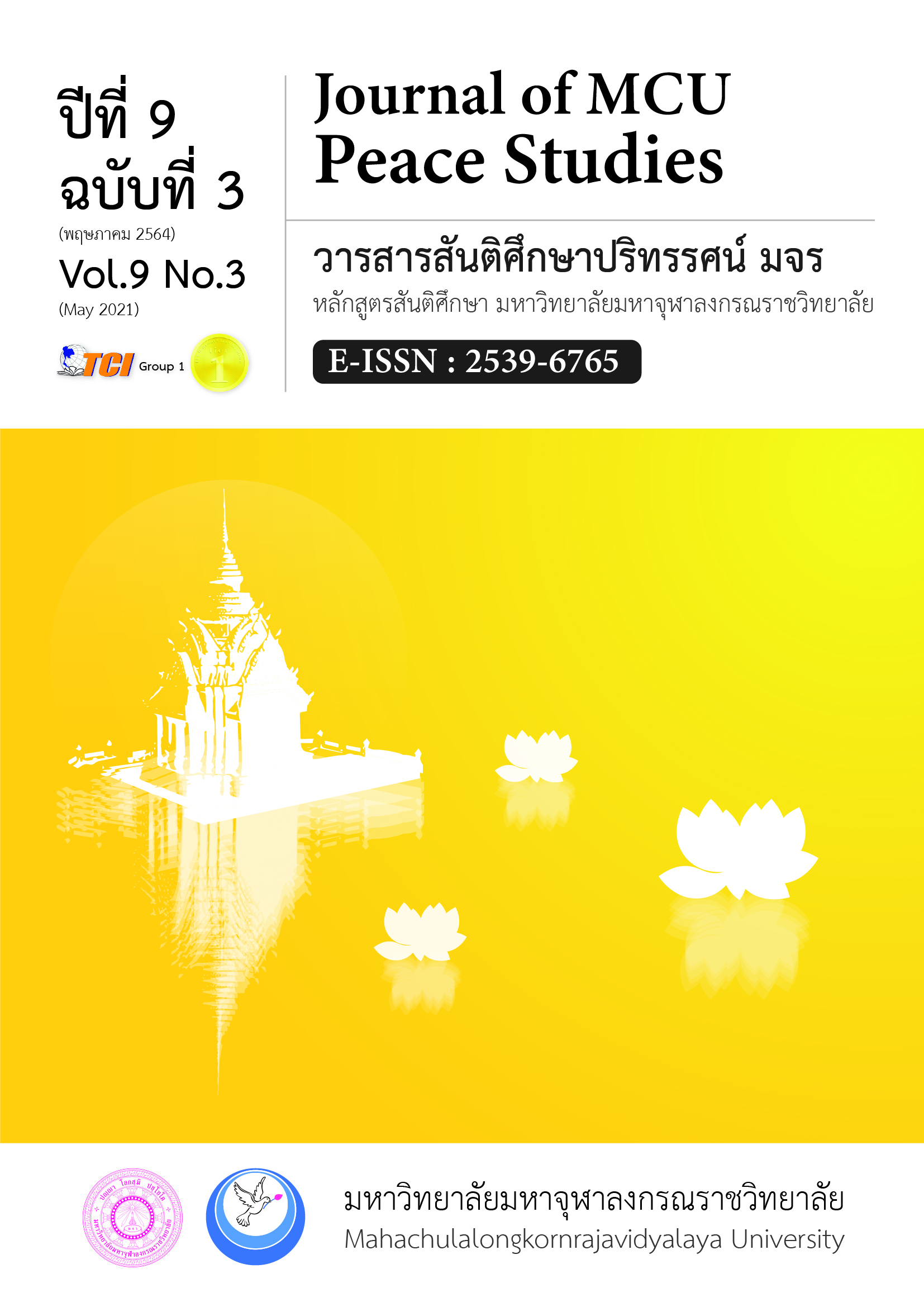การพัฒนาสมรรถนะผู้นำด้วยรูปแบบนวัตกรรม การสร้างวิศวกรสันติภาพท้องถิ่นที่ส่งผลต่อการสร้างสรรค์ชุมชนให้เกิดสันติสุข
Main Article Content
บทคัดย่อ
บทความวิจัยนี้มีวัตถุประสงค์เพื่อ 1) เพื่อเสริมสร้างสมรรถนะผู้นำท้องถิ่นในการเป็นวิศวกรสันติภาพเพื่อสร้างสันติสุขของชุมชนในจังหวัดปทุมธานีและจังหวัดพระนครศรีอยุธยา และ 2) เพื่อประเมินหลักสูตรและนำเสนอการพัฒนาหลักสูตรการเสริมสร้างสมรรถนะผู้นำด้วยรูปแบบนวัตกรรมการสร้างวิศวกรสันติภาพท้องถิ่นที่ส่งผลต่อการสร้างสรรค์ชุมชนให้เกิดสันติสุข ดำเนินการวิจัย 4 ระยะ โดยใช้กลุ่มทดลอง 2 กลุ่มตัวอย่าง ได้แก่ ผู้นำท้องถิ่นในจังหวัดปทุมธานี จำนวน 25 คน และจังหวัดพระนครศรีอยุธยา จำนวน 18 คน เครื่องมือวิจัยที่ใช้ ได้แก่ แบบสัมภาษณ์เชิงลึก แบบวัดสมรรถนะวิศวกรสันติภาพท้องถิ่น การสังเกตการณ์อย่างมีส่วนร่วม การสะท้อนคิด สถิติที่ใช้ ได้แก่ ค่าร้อยละ ค่าเฉลี่ย ค่าเบี่ยงเบนมาตรฐาน และวิเคราะห์เปรียบเทียบค่าเฉลี่ยด้วย ค่าที ผลการศึกษาพบว่า สมรรถนะวิศวกรสันติภาพท้องถิ่น ได้แก่ 1) การสร้างการมีส่วนร่วมให้ชุมชนได้เรียนรู้พัฒนาบนวิถีสันติวัฒนธรรม 2) การสื่อสารสร้างสันติและจัดการความขัดแย้งอย่างสร้างสรรค์ 3) การปฏิบัติตนเป็นต้นแบบมุ่งสู่วิถีแห่งสันติ 4) จิตตระหนักรู้วิถีสันติภายในตน 5) มีอุดมการณ์การเป็นผู้มีความเป็นธรรม รูปแบบที่นำมาใช้พัฒนาหลักสูตร คือ หลักไตรสิกขาเป็นฐานการเรียนรู้ การเรียนรู้เชิงรุก การมีส่วนร่วมในการเรียนรู้ผ่านการลงมือทำ การสอนงานแบบพี่เลี้ยง ผลการทดลองใช้รูปแบบ พบว่า ผู้เข้าอบรมมีสมรรถนะวิศวกรสันติภาพท้องถิ่นทั้ง 5 ด้าน ก่อนทดลองและหลังทดลองแตกต่างกันอย่างมีนัยสำคัญทางสถิติที่ระดับ 0.05 พบองค์ความรู้ใหม่ “สามพลังพัฒนาวิศวกรสันติภาพท้องถิ่น” ได้แก่ พลังที่ 1 หลักการเรียนรู้เพื่อการเปลี่ยนแปลงตามหลักไตรสิกขา พลังที่ 2 การเสริมสร้างสมรรถนะด้วยโค้ชกัลยาณมิตร พลังที่ 3 คือ 6 ก้าวย่างแห่งการเรียนรู้สันติกระบวนทัศน์ด้วยสติ 6 ขั้นตอน
Article Details
ทัศนะและความคิดเห็นที่ปรากฏในบทความในวารสาร ถือเป็นความรับผิดชอบของผู้เขียนบทความนั้น และไม่ถือเป็นทัศนะและความรับผิดชอบของกองบรรณาธิการ ยินยอมว่าบทความเป็นลิขสิทธิ์ของวารสาร
เอกสารอ้างอิง
Pansuwan, A. (2014). The Development of Community Leader Characteristics in Accordance of Phranakhonsriayuthaya. (Doctoral Dissertation). Graduate school: Mahachulalongkornrajavidyalaya University. Ayutthaya.
Phra Dharmapitaka (P. A. Payutto). (2001). Buddhist methods of teaching. (8th ed.). Bangkok: National Education Agency.
Phra Promkhunaporn (P.A. Payutto). (2013). Thai Educational Philosophy in the Buddhist Sector: Education Leader. Bangkok: Phli Dhamm.
Phramaha Hansa Dhammahaso. (2018). The Integration of the Knowledge in Field of Peace for Developing Peace Building Process in Thai Society. Journal of MCU Peace Studies, 6(3), 1254-1266.
Sandmann, L. R., & Vandenberg, L. (1995). A framework for 21st century leadership. Journal of Extension, 33(6).
Sandmann, L. R., & Vandenberg, L. (1995). A framework for 21st century leadership. Journal of Extension, 33(6).
Comrey, A. L., & Lee, H. B. (1992). A First Course in Factor Analysis. (2nd ed.). New Jersey: Lawrence Erlbaum Associates.
Chantrawutikorn, S. (2019). Study and Development of a Training Model Based on Threefold Trainingto Strengthen Ethical Leadership for Executive Officers and Team Leaders in an Organization. (Doctoral Dissertation). Graduate school: Srinakharinwirot University. Nakhon Pathom.
Wattanapradith, K., Seethong, K., Rojjanauthai, S., & Areekul, C. (2018). The Holistic Development of Mind and Wisdom: Documentary and Research Synthesis (Research Report). Ayutthaya: Buddhist Research Institute of MCU.
Wattanapradith, K. (2016). Peace Community in the 26th Buddhist Century: Knowledge Learned from Peace Community in Conflict Areas. Journal of MCU Peace Studies, 6(Special), 13-24.
Wongyai, W., & Phatphon, M. (2019). The Coaching for competencies. Bangkok: Center for Innovation, Curriculum and Learning Leadership.
Singmatr, S., Meemana, P., & Kaewin, D. (2017). Leadership traits of the Executive in the 21st century. Retrieved December 21, 2020, from http://gs.rmu.ac.th/grc2017/fullpaper/file/PS-O-01.pdf.


